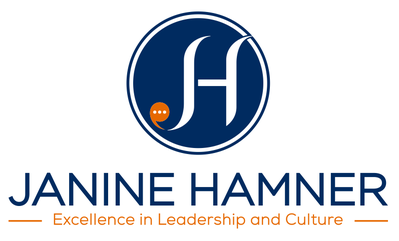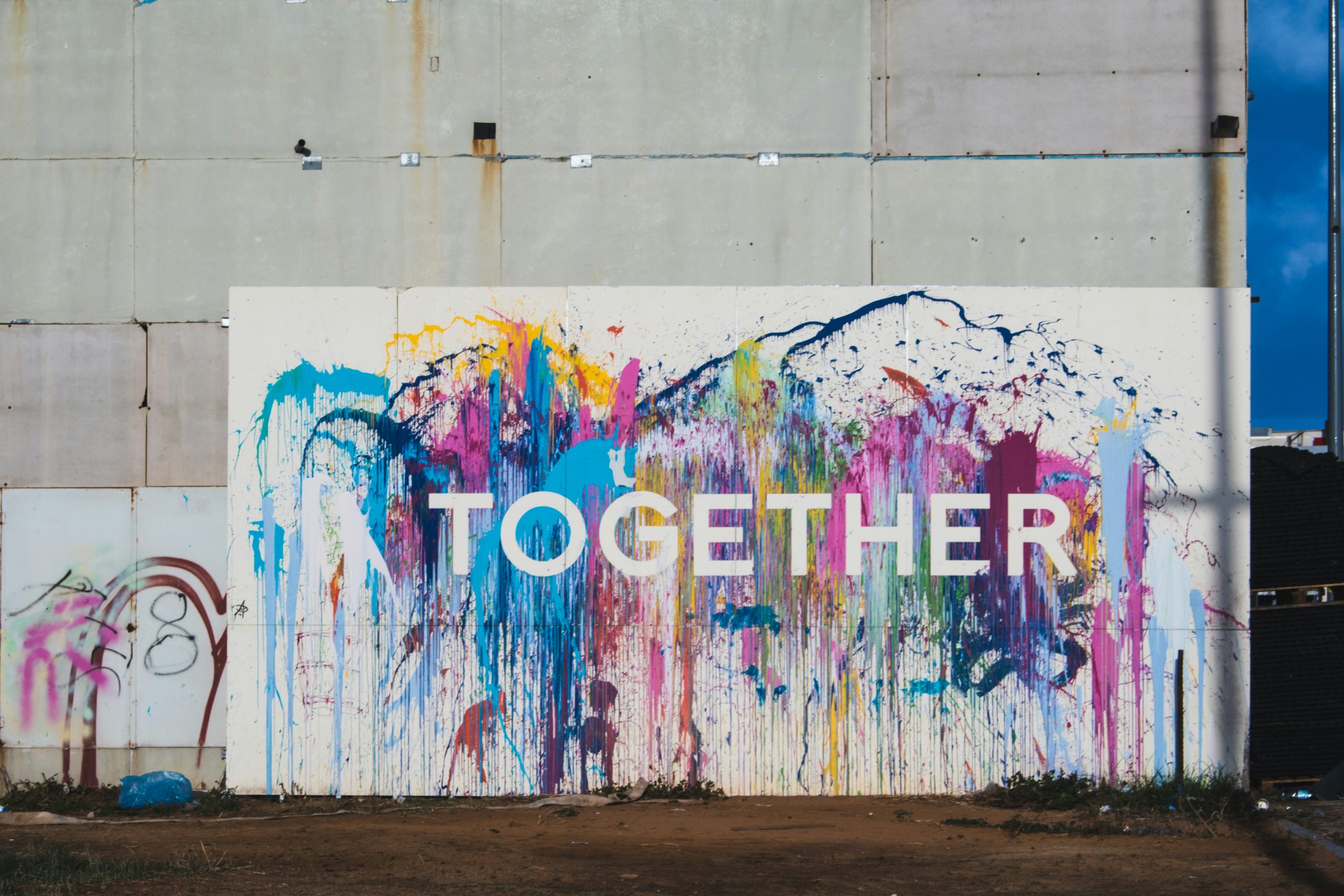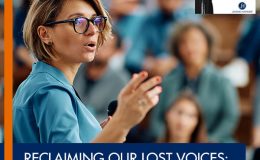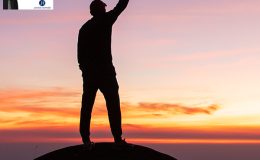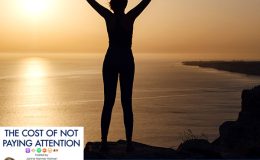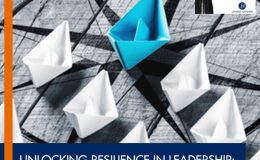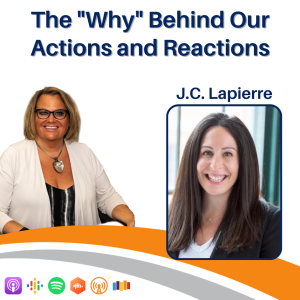
What’s your why in life and work? How does your drive, your curiosity, make a difference in your career? In this episode, Janine Hamner Holman sits down with J.C. Lapierre, a business strategy and communications leader, to discuss the why behind our actions and how those actions affect our sense of community.
GUEST: J.C. Lapierre | Instagram, LinkedIn
HOST: Janine Hamner Holman | Janine@JandJCG.com | LinkedIn, Facebook, Instagram
What am I paying attention to today? There’s this interesting interplay between how polarized we seem as a people and nations and the continued emphasis by a lot of organizations on initiatives having to do with diversity, equity, inclusion, belonging, all of those things or some of those things.
One of the things that interests me and gives me hope is that polarization often relies on creating an us versus them mentality. It’s necessary to other people so we put them in a box and view them as different from us, and then we perceive all the folks in that box or those boxes negatively. One thing I believe is so helpful for any real initiatives seeking to increase diversity, create equity, and create experiences of inclusion and belonging is that often, especially when they’re done well, they can break down these stereotypes and biases.
We can realize, “Oh my gosh, this young man grew up in a village in Africa and he’s a different gender than me and he grew up in a very different place than me. Yet I see very similar things between his experience and mine.”
This creates opportunities for empathy and respect, for differences, and appreciation for differences. It can create a much more inclusive environment seeking to have diverse voices and diverse lived experiences, be heard, and be valued, which not only helps support and increase the organization’s bottom line but also can mitigate the detrimental effects of polarization.

But it only works when it works well. It only works when it’s constructed well, when it’s constructed to ensure longevity, and not done as a one-off. Which brings me right to our guest for today. This is someone who has spent a significant portion of her career creating these kinds of initiatives that work.
J.C. Lapierre serves as the U.S. Chief Strategy and Communication Officer for PwC where she creates strategy and collaborates with leaders to help develop, communicate, and sustain corporate initiatives. J.C. is a purpose-driven leader who was a key force in creating PwC enterprises such as the Trust Leadership Institute, the CEO Action for Diversity and Inclusion, and their new equation strategy update. Welcome to the show, J.C.
It’s such a pleasure to be here. Janine, thank you so much for having me.
You are so very welcome. Let’s dive into it. Tell me, what is something you have become aware of that we are not paying enough attention to you either consciously or unconsciously, and what is the cost of our inattention?
I absolutely loved your opening. You spoke right to my love language. My thesis in college was written on ingroup outgroup biases, so oh my goodness. I didn’t know that’s where you would start, but it is something I have studied my entire life and is completely aligned with where I wanted to start: Where I don’t think people are paying enough attention is around the why.
We have lost sight of wanting to understand why when somebody says something at first blush or when somebody is asked to do something, We have this auto-response because we’re so busy because of what the last few years have thrown at us. By gosh, it’s been hard, but we’ve lost the ability to sit and think about why a person is acting a certain way. Why are they asking for that thing, wanting it of me? It’s the start of such understanding.
I love that. One of the things I work with clients a lot on is curiosity. That ties in very much because when we can ask, when we can get authentically curious, we’re good at faking curiosity, “Ellen, that’s interesting.” We have this tone that says, “Yeah, really, I could not care less. Mostly I think you’re full of shit.”
When we let that go and be authentically curious, genuinely curious, it’s a different viewpoint than where I see things from. Then we can ask for help in our understanding.
I had such a privilege to sit in a class last week. I haven’t gone back to class in quite some time, but I sat in an executive education class and it was on trust, one of my favorite subjects.
The professor was talking about how curiosity and judgment cannot coexist, and I loved that. Of course, Ted Lasso, one of my favorite shows I’ve watched who knows how many times, but he says, “Be curious, not judgmental.” The professor’s point, which was so wonderful is that they can’t coexist.
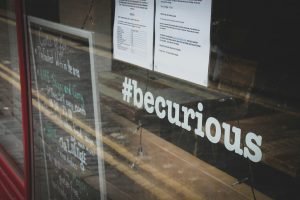
If you truly focus on curiosity and put yourself in the mindset of asking the why and being curious, you take away your ability to be judgmental. I loved that thought. It’s so important and needed now more than ever.
I love that. I hadn’t heard that specific construct, and I wrote it down that curiosity and judgment cannot coexist. I don’t know about you, but I am a human, and I can be very judgy in my own brain, and I work hard on letting that go. I love the idea that just being curious can help wipe that judginess out of the lens I’m looking through.
You said in college the other end was part of your thesis. Do you know where this curiosity about this thing we do and the detriment, and not just detriment, but the real harm it causes, where does it come from in you?
I think community is one of the most important things we can surround ourselves with. Human beings are meant to be with other human beings. Community is so important. No matter where you get that from and there are so many places to do so, it is critical. While growing up, I got to see community in a way where it was judged, it was ostracized, and it was suggested it was less than or perhaps even bad growing up in a family with two religions and different socioeconomic backgrounds.
I was struck by how we use community for good and how you can use community where, in my mind, it becomes dangerous and where you use it, because it becomes judgmental and it becomes something that divides versus unites.
I’ve dedicated a huge amount of my life personally and professionally to focusing on that which binds us and that common humanity. As I travel the world and meet more people, I am always struck by how there is so much more that unites us than divides us.
Yet what we seem to spend so much time on are the things that divide us, the things that make us different. I love the genetic profiles and things that point to how ultimately fundamentally the same we all are. I happen to be married to a man, and he is also a black man, and yet there are so many things about the two of us that are so similar.
Of course, many things are different, which is what makes it interesting to be married to him. We get so hung up on the things that are different. I know PWC has spent an enormous amount of time and energy on creating opportunities for us to come together. I am very curious. I went on the website and you have to look deeply for what the services are. Back in the day, it was Price Waterhouse Cooper, a big accounting firm.
To find anything about accounting or any of the other sort of core services you folks have historically provided, you have to hunt for that stuff. The forward-facing pieces on your website are about trust, inclusion, and leadership. That got me curious about the evolution of this large organization.
Can you fill me in on how that all happened and why that all happened?

I would love to. I think where it starts is an enormous responsibility and commitment we have to be a part of solving whatever is most on society’s mind and that which we need to pay attention to. We need to address this so our clients can be as productive and effective as they possibly can be, so our people can be as productive and effective as they possibly can be.
It helps us create these relationships where there’s a value exchange that makes sense. To me, that’s what trust is. Trust is the foundation upon which all value can be created. We can create value by ourselves individually, but that only goes so far.
We can only create it in a limited way. It’s not anything big in the world. We need to pull other humans in…
… and partnerships and then more humans. The bigger the platform, the greater the trust, the more value you can create and it becomes exponential, which is so exciting when you see it multiply. For us, our purpose is to build trust in society and solve important problems.
We get the tremendous privilege of helping so many different organizations solve whatever is on their mind. They need help with audited financial statements. That’s our heritage and we love to do that. They need help with their taxes. We can help in whatever way you need to do a system implementation. You need to figure out how to unlock new outcomes from business model reinvention or addressing climate transition.
Whatever your need is, we can help. We also want to make sure we are there to build trust in society. We are taking on and putting in our own hard work towards solving those things and making them a little bit better for society. The general principle we follow and something I’m proud of is we recognize nobody can solve it alone. We don’t want to solve it alone.
My greatest joy in being at PwC for 27 years is I feel a part of the most wonderful team. My teams change every day and we solve different problems every day, but you don’t have to go it alone. We’ve brought that principle into everything we do, whether it’s a trust leadership institute or CEO action for diversity and inclusion or the new strategy we’ve launched, which is we want to bring all of these incredible organizations together because together we can accelerate how we go after those things in big, important ways.
We’ll put in our time, we’ll put our thought leaders in there, and we will bring great expertise to the table. We also want to make sure we bring others together and give the right environments so we can create more for more people along the way.

With what I am up to in the world, I am personally on a mission to have the world of work be one in which everyone can thrive. I’m not getting there in this lifetime, nor am I getting there by myself. The journey has been about finding people like you and all of the amazing people who are working in all kinds of ways to have the world of work be one in which everyone gets to thrive.
It’s a big leap, however, from being an accounting firm to being an organization with a much broader, larger mission. What created that shift? Normally when I think of accountants, I don’t think of the folks who are interested in interpersonal connections and world climate change. They aren’t people with a brain oriented in that way.
I’m curious about what created the opportunity for this organization whose heritage is around financial literacy and accounting to make this kind of shift.
It comes first from listening to our clients, and our CEO, Tim Ryan. He’s exceptional at listening. He always says if you listen well enough, the answer will show itself as to where you need to go and how you need to lead. He has the same philosophy with our people. When you listen to our clients and what they need, you can’t do audited financial statements unless you have incredible cyber skills because the world of risks has changed.
You need to think about how you want to provide assurance differently because people are asking for assurance around the things you’re suggesting you’re going to do around net zero and your climate transition around AI and responsible AI. We recognize early on because we listen to what’s happening in the world and where it’s headed, what are the capabilities we need to grow? How do we need to invest in different partnerships, relationships, and skill sets for people to come in so we can continue to lead?
When our clients say, “I need help with this,” we can meet that calling. Over the last few years, we have been building a true multi-competency professional services firm. Again, the basis and heritage have been auditing in the tax work we do, but we’ve built it into these remarkable capabilities and the diversity of skills allows us to do so much more.
That’s wonderful and amazing and I love that where you started was listening and that where he started was listening. One of the things I’ve had an opportunity to talk many times about here is many of us have collapsed listening and hearing. If we have auditory capabilities, hearing just happens, and listening is a skill that must be developed. The fact that Tim Ryan has honed that skill and worked so hard has enabled this amazing transformation of PWC. It’s phenomenal.
Talk to me a little bit about the Trust Leadership Institute. What is it? How do you find people who are interested in it? If I want to join the Trust Leadership Institute or anybody who’s reading this, can they? How does it all work?
We rolled out a new strategy a couple of years ago. Like every organization, you continue to evolve your North Star around where you’re headed, listening to your clients and your other stakeholders and what they expect and need of you. Our strategy is predicated on the belief all organizations will need to deliver two things in the years to come.
Those two things start with building trust with your stakeholders, of which we all have many more stakeholders now. Those stakeholders’ needs and expectations have proliferated at a rate that is surprising to I think everybody but is so important.
The second is delivering sustained outcomes. You can no longer focus solely on short-term anything. It’s about the concept of sustainability and creating sustained outcomes. While there is great debate about one versus the other, you can hear it in the purpose versus profit.
We believe it’s both. We believe companies are built to make profits and then they do responsible things with those profits and they allow trust to be built and for our society to continue to evolve. That’s the basis of our strategy, the new equation.
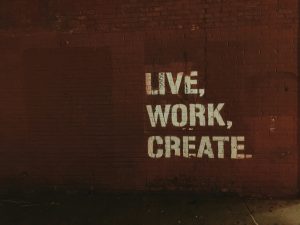
Anytime we release any new concept around our strategy, we also want to make sure we are intentionally doing things as we also do the same things that we would for any reason. Any company would focus on profit as well as a return to investors.
One of those was to say trust is at an all-time low. In our society, I think we can all agree about the polarization between what we’ve all endured over the last several years, it is really hard to find trust in endless supply right now.
In fact, business leaders are looked to so much more to be beacons of that trust and to help to build trust. We said, if we believe that is where we need to accelerate learning and we need to accelerate action, can we bring together groups of executives who want to focus on what trust means today? How do you build trust in climate transition? How do you build trust in the new way employees like to work and think about new ways of working? How do you build trust in technology and AI?
We said, let’s do that. Let’s build a way in which we can come together. We’ve brought together over 600 execs in the past 18 months from 400 companies. Over three days we go deep into every part of a business as well as personal trust. We give some amount of content and then allow small groups to explore, talk about what they don’t know, and talk about how can we help each other and bring great learning and acceleration back to our respective organizations so we can do more faster.
That’s the heart of the Trust Leadership Institute. We do monthly webcasts on relevant topics. There are lots of different ways to engage, but primarily it’s meant for those with big platforms and those who can make change happen faster.
I love that. You’re focusing on how can we have one plus one or 200 plus 200 equal a million. What is our opportunity to accelerate, in a positive way, the pace of change? I know so many of us are in a place where we feel like change is never-ending.
I’m working with an organization right now that is dealing with some change fatigue. We’re talking with folks about how you help mitigate that. How do you help manage through change? Also, how do we develop personal and organizational resilience to be able to deal with the never-ending increasing pace of change we are all in? Most organizations are finding themselves pushed to make changes faster than it’s often comfortable.
How do we create personal and organizational resilience to manage that level of change? I love that it sounds like that is part of what you guys are focused on as well.
I could not agree more. I don’t even think it’s just change fatigue. I think it’s fatigue, fatigue. The world is fatigued and you hear it come out in ways. Again, when you’re listening, you hear people talking about mental health, you hear burnout, you hear people talk about needing a reduced schedule or to-do list, or not knowing how they’ll get everything done.
Focusing on exactly what you said, we can help build resiliency organizationally, but also we can help people individually in a new world, in a new day. I’m not sure if you saw, but part of our new equation strategy is our new people strategy I am so excited about. It’s called My+ and over three years our goal has been to allow people to personalize their career in a way that works for them and as it evolves, while still meeting our client’s needs.
We believe if we can solve that for our people, we will get more engaged again in that trust equation. We can extract more value, not in a crude way, but in a very meaningful and authentic way. We want that value exchange to be huge between each other.
We’re focused on leveraging technology to give people more agency over the choices around their growth and development and how they take on engagements and assignments at PwC in terms of saying, “I want more customized rewards and benefits and I don’t want you to suggest what they should be. For me, I want to be able to choose those and recognize that they change as my career changes over time.”
What we’ve been putting in place along the way, and last week we launched our marketplace, which is where people can go to learn about available opportunities and how they build their skills to get there in this effort to allow people to personalize their careers in a way that makes the most sense for them.
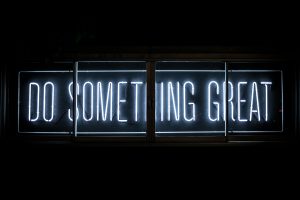
That’s wonderful and brilliant and highly unusual. It’s a big change to make in all areas of the organization. Let’s start with an idea about benefits.
One of the significant shifts happening in some organizations to a degree is a move away from only 401Ks to also education reimbursement, and not only for colleges, but any kind of education and professional development.
As organizations think about the development of benefits and expansion of the ideas around mental health, wellness, and ongoing normalization of being able to talk about mental health as a health benefit, how did you guys get started in that? How can other organizations get started?
It’s such a good question. I don’t mean to be repetitive, but I do think it starts with listening. I’ll give you a great example. We started, I can’t remember how long ago it was, let’s call it eight years, we decided to shut down our firm for the holiday break. It is hard in a client service-driven organization to truly detach and take a vacation when everybody else is still going and your clients are asking for things.
Many of our people would say vacation doesn’t always feel relaxing and they cannot always disconnect. We’ve heard that message over and over again. We put that holiday break in where we all shut down for roughly eight to 10 days depending on how the holidays fall. We heard from our people that they have never been able to disconnect in the way they did, and it was so strong and such a steady drumbeat.
The notes that came in, the surveys that we do in focus groups, it was so loud and we said, “How can we build on this? Not just take this as one thing and keep doing that?” We added two more things. One was, if this truly can allow everybody to disconnect and take a wellness break, let’s also do it on the 4th of July. Every six months, you get one week off where the whole farm is shut down and we truly all take a small break from each other because we all need breaks from each other.
The other thing we did was we put in place a tool. We have this little assistant called Astro. I use Astro for many things, booking my offices and time. When you take vacation, you tell Astro when you’re taking vacation, and it sends a notification to all the people you report to in advance of your vacation as almost a countdown reminder.
When you come back you get a survey that asks, were you allowed to take vacation uninterrupted? If you were not, why? We want to drive out where that can’t happen. Part of what we try to do is listen and think about how can we put in ways to tell the system what we expect for the leaders and our people.
A lot of that is for the leaders to create the environment where this should be, but then also let’s do some things like add that second shutdown and allow people to take that time and disconnect.
I love that. Tell me a little bit about the CEO Action for Diversity and Inclusion initiative.
That’s been amazing to watch as it has grown since we started about five and a half years ago. It is very similar to the Trust Leadership Institute in the way that at that time, and of course you could say that still is the case, but it was something a lot of leaders were struggling with and didn’t know how to not solve but advance. The question was, how do I make more progress in my workplace because I recognize this is something we need to do differently and do better.
In talking to so many different organizations, everybody had the same challenge and we thought this is not one where we should be competitive. This is one where we should be collaborative and let’s all agree to do a couple of things, one of which is to share the resources we have that are working well to advance and accelerate what we’re all able to do. The second is to share what hasn’t worked and what we’re all struggling with and say, “Don’t try that.”
“Don’t try that.”
“It’s a loser, not a winner.”
We came into it with three basic commitments people would work to create a culture and an atmosphere where people could bring themselves to work and have more open and honest conversations. The plan was to execute some training around any kind of biases or ways in which people might be limiting the ability to have an open organization in that way. The third was to share resources and we were hoping to maybe get 10 or 20 organizations to sign up.
I remember calling company A, and company B, and of course, they asked who else had signed on. I said so many people…
“You’re my first call, but so many people have signed on.”
We launched with 75 companies and in the last two and a half years we’re now at 2,500 organizations who have signed on, and these are CEOs. CEOs have to sign on because they have to say, “I am willing to prioritize this and take these actions.”
It is a wonderful way in which you can collaborate, share resources, and get help when things get hard and when there are events where we’re all learning together. That is what we’ve tried to build and bring to others in a way, again, collaboration versus competition.
I love it. I’m curious with all of the anti-woke, with the backlash, with the politicization…
Of these initiatives, which of course there’s nothing political about having people experience belonging, that’s not a political initiative… Have you experienced a decline in organizations participating? Have any organizations left? What’s been the impact of the challenges happening in the world on this initiative?
I don’t think we’ve experienced a dip in intention and in wanting to create workplaces where everyone can thrive. I think what has happened is we’re trying to figure out in light of new laws and where the world is headed, how to do this in a way that makes sense. How can we deliver it for our clients?
That’s where we start. It takes diverse thinking and diverse lived experiences to be able to solve these incredibly complex challenges and opportunities our clients put in front of us. We stay focused on what we’re doing for our clients and then build backward. It’s a bit harder to figure out the ways we need to do this now.
That’s where coming together can help. We can share ideas and share what we’re learning in real-time and continue to still make progress.
For me, working with clients in this arena through the inclusion and belonging door, I think at this moment in time, if we have an organization where everyone is included and everyone belongs, we have diversity and equity.
There are opportunities to come through that door, especially if part of what we know is one of the intentions is to create diversity, and create different kinds of perspectives and lived experiences. One of my clients is a trash company, their mission is to pick up the trash and recycling and get it to wherever it’s supposed to be going and figure out what we’re supposed to be doing with organics. A lot of those are more complicated than they may sound, but it’s pretty straightforward nonetheless.
We’re doing a big belonging initiative and working with all the different stakeholders, as you were talking about in benefits that the organization provides because often their employees are largely Latino and trash truck driving has historically been a male-dominated industry and in many ways still is.

How do you get the spouses, partners, girlfriends, abuelas, and all the different people in the community to know the benefits being driven by the employment of this one usually man? All of the different benefits can be accessed by whatever the family unit might look like. It’s about broadening the perspective of belonging to include the family unit. The reason they got into doing it was to brand themselves as an employer of choice.
There’s a trash truck driver shortage in the nation. There’s competition for drivers to think differently about inclusion. We can have a more robust organization with more longevity and trust in the drivers, and ultimately they’re the brand ambassadors for the organization. How do you push that message out? I love the way you guys are going about this.
I’m also curious, is there material, like white papers or thought guides? Is there stuff being generated from the learning being created others can then engage with?
Yes, and that’s a substantial part of what we offer for people who join CEO Action. There are incredible resources people get access to. There are some for people who don’t join. We have a website, CEOActionforDiversityandInclusion where people can check out resources.
To me, it is absolutely about inclusion and belonging. I come back to the word trust for trying to unlock more value. I view everything as a challenge to unlock more. I can’t get to the total of what’s possible and what’s there if I don’t take the time to build that trust, to ask really good questions, and make sure I understand the why, coming back to where we started and understand why, so I can help to unlock more possibility within me.
Some of it is self-serving because I love to learn and it allows me to learn. I also truly believe that when we do that for each other, we give such a gift to each other to get more and to create more of that value, and it’s a joy to know you’ve created value somewhere somehow.
I love it. I want to give you an opportunity if there was anything you wanted to share about that we haven’t yet had an opportunity to talk about. I want to give you that mic for a minute.
I think less about something new, but perhaps a challenge to all of us as we turn our calendars to a new year to focus on that why, being genuinely curious, and figuring out what we have in common versus what’s different as we go into each of our interactions for 2024. We all individually can make collectively an enormous difference.
Beautiful. Thank you so much for sharing with us a bit about your why and a bit about the development and evolution that’s happened at PwC. Thank you for sharing the brilliance that’s come from all of the work you have done to have the world and the world of work be one in which everyone gets to feel included.
Thank you for helping this organization you are helping to guide, to expand its vision, and take on big challenges and to do so in a way that is so collaborative and partnering rather than the alternative, which is often what we see in corporate America. Thank you for who you be.
Thank you. I accept that, but it is on behalf of quite a few people who have invested a ton of time into this venture. On behalf of that incredible team I get to work with to do this, thank you for giving us the opportunity to share the story.
I’m happy to do it. I am Janine Hamner Holman and this has been The Cost of Not Paying Attention. Remember, great leaders make great teams. Until next time.
Important Links
CEO Action for Diversity and Inclusion
About J.C. Lapierre
 J.C. Lapierre serves as Chief Strategy and Communications Officer for PwC, in which capacity she creates strategy and collaborates with leaders to help develop, communicate and sustain corporate initiatives. J.C. has created investment capacity, designed digital transformation and helped architect and launch PwC’s Trust Leadership Institute as well as its New Equation strategy update. She also helped create and guide PwC’s CEO Action for Diversity & Inclusion — the largest CEO-driven business commitment to advance diversity and inclusion in the workplace. She was named a 2022 PRWeek Woman of Distinction, as well as 2022 Outstanding In-House Professional of the Year.
J.C. Lapierre serves as Chief Strategy and Communications Officer for PwC, in which capacity she creates strategy and collaborates with leaders to help develop, communicate and sustain corporate initiatives. J.C. has created investment capacity, designed digital transformation and helped architect and launch PwC’s Trust Leadership Institute as well as its New Equation strategy update. She also helped create and guide PwC’s CEO Action for Diversity & Inclusion — the largest CEO-driven business commitment to advance diversity and inclusion in the workplace. She was named a 2022 PRWeek Woman of Distinction, as well as 2022 Outstanding In-House Professional of the Year.
